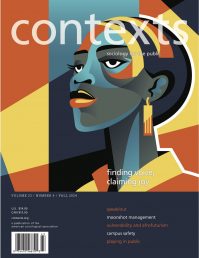Sociologist Stacy Torres examines why higher poverty rates persist among older women compared with older men and finds that women continue to face significant economic disadvantages in old age, partly due to a lifetime of unpaid, work-interrupting care giving responsibilities. Read More
Five experts, Lisa Wade, Brian Sweeney, Amelia Seraphia Derr, Michael A. Messner, and Carol Burke, discuss how institutions deal with sexual assault and whether or not policies really protect victims. Read More

Librarian Jill Cirasella describes some problems with the traditional system of scholarly journal publishing and explains how scholars can make their works open access, or freely available online. She discusses some of the benefits of open access, as well as some of the challenges to achieving widespread openness. Read More

Professor Emeritus, Armand Mauss, talks with sociologist Jodi O'Brien about his experiences as a Mormon and a sociologist. Read More
Sociologists Grace Yukich, Kimberly Stokes, and Daniela Bellows explore cultural norms around religious displays in sports, and in public life more generally, by examining media coverage of controversial football player Tim Tebow. Read More
Analyzing the media coverage of the 2013 Brazil protests, sociologist Katherine Jensen uncovers that violence against white women became the rallying cry for popular political action, while black mobilization was depoliticized as violent chaos and violence against blacks was ignored. Read More
Drawing on more than five years of research with women who inhabit a circuit of suffering made up of prison, homeless shelters, drug programs and the streets, sociologist Susan Sered argues that punishment and treatment often function as two sides of the same coin: a coin that construes women's suffering in terms of their private traumas, personal flaws, and poor choices. This ideological script functions to blame the victim, obscure the structural causes of poverty and violence, and absolves governments from public responsibilities for the well-being of citizens. Read More
Sociologist Jennifer M. Silva examines how working-class men and women navigate the transition to adulthood amid economic insecurity and social isolation. She finds that young adults experience fear of intimate relationships, low expectations of work, and widespread distrust of institutions as they come of age. Read More
Urban sociologist, Virág Molnár, reviews the books No Billionaire Left Behind and Thank You, Anarchy. The books examine satirical activism and Occupy Wall Street's mix of direct democracy and anarchism as examples of unconventional political protest in the contemporary United States. Read More
Scholar Micere Keels explores the rise of college-educated women of color having children outside of marriage. Read More


